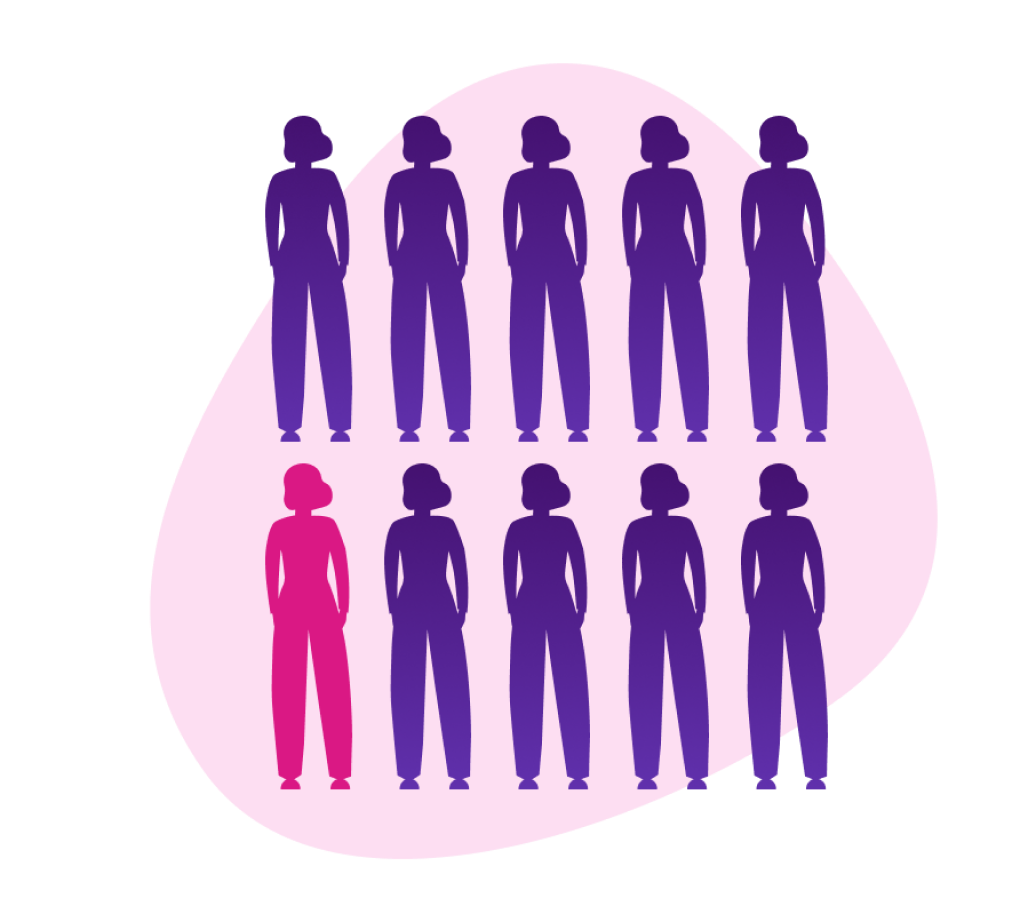
Breast cancer is the most common cancer affecting Australian women.1 Getting older and being born female are the two biggest risk factors.
Did you know?
- Each year over 20,000 women and 200 men in Australia will be diagnosed with breast cancer.
- The risk of being diagnosed with breast cancer over a lifetime is 1 in 7 for women and 1 in 555 for men.
- Breast cancer accounts for about 28% of all new cancers in Australian women.
- Each year about 3,000 women and 30 men in Australia will die from breast cancer.1475
Breast cancer is common and most breast cancers are not caused by known genetic factors. Most women who develop breast cancer DO NOT have a family history of the disease. Only around 5% of breast cancers are due to a strong family history or genetic mutation, such as BRCA1 or BRCA2.1522

9 out of 10 women with breast cancer do not have a family history of breast cancer.1477
It may be recommended that you have an annual breast screen from age 40 if you:
- have a first-degree relative (such as a parent, sibling, or child) diagnosed with breast cancer before age 50.
- are assessed by BreastScreen NSW as needing more frequent monitoring.
- are assessed by your doctor as being high risk.
If you have a blood relative diagnosed with breast cancer over 50 years old and no other contributing factors, then you are at similar risk to developing breast cancer as the general population. You will be offered a breast screen every two years.
Speak to your doctor if you are worried about your family history of breast cancer. You should inform your doctor and BreastScreen NSW about any new cases of breast cancer diagnosed in your family since your last breast screen.
The Peter MacCallum Cancer Centre iPrevent™ breast cancer risk assessment tool is designed to help discussions between women and their doctors. Click here to assess your risk of breast cancer.
Want to know more? Talk to your doctor if you have any questions.
Manage your breast cancer risk
There are things you can do to manage or reduce your risk of developing breast cancer. Factors that can be changed are called modifiable factors.1525
| Limit alcohol intake - the more you drink, the greater your breast cancer risk. If you do drink alcohol, limit your alcohol intake to 1 standard drink a day. | |
| Maintain a healthy body weight – keeping to a healthy weight range reduces risk of breast cancer. Breast cancer is more common in women who are above a healthy weight. | |
| Engage in physical activity - active women of all ages are at reduced risk of breast cancer compared to women who do not exercise. Aim for at least 30 minutes of moderate-intensity physical activity every day. The more exercise you do, the bigger the benefits. | |
| Menopausal hormone therapy (MHT)/hormone replacement therapy (HRT) - using menopausal hormone therapy (MHT) that contains both an oestrogen and a progestogen is associated with an increased risk of breast cancer, with the risk increasing the longer you take it. If you are taking MHT, review your needs regularly with your doctor. | |
| Breastfeeding - breastfeeding can reduce the risk of breast cancer – and the longer the duration of breastfeeding, the greater the benefits. |
Other useful links
Get Healthy NSW offers free health coaching over the phone to help you reach your health goals, including cutting down on alcohol. Go to Drink less alcohol for information about alcohol and cancer risk
Eat healthy provides information and support to make healthy changes for cancer prevention. Also Healthy Eating Active Living is a NSW Government website with healthy eating tips and information on free programs to get you active.
The Australian Dietary Guidelines tell you what foods to eat and how much. They also tell you what foods to avoid.
Be more active provides information and support to reduce your risk of cancer. Also Australia’s Physical activity and sedentary behaviour guidelines tell you how much exercise you should do each day. They also give tips on how you can get started.
iCanQuit provides handy tools and practical advice to help you begin your quit smoking journey – and stay quit for good.
If you have any questions about your personal risk of breast cancer, please speak with your doctor.
Understand this important cancer screening test.
Know the facts and risks.
Find out if you are eligible to screen with BreastScreen NSW.
Know what you should look out for.
What to expect before during and after your breast screen.





